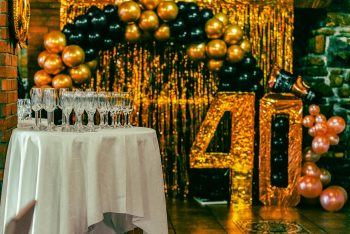Often, we picture entrepreneurs as young, tech-savvy individuals in hoodies disrupting industries with their groundbreaking ideas. Truth be told, though, entrepreneurial success knows no age limit. In fact, some of the world’s most iconic businesses and influential figures were born later in life, proving that experience, resilience, and audacity can overcome perceived limitations. These stories inspire and motivate us to create something new when we have a few more candles on our birthday cake.
That said, let’s examine the tales of these late-blooming entrepreneurs and learn from their golden nuggets of wisdom.
Table of Contents
Toggle1. Colonel Harland Sanders – Kentucky Fried Chicken (KFC)
Colonel Harland Sanders is one of the most famous entrepreneurs who started later in life. Having worked various jobs, including firefighter, streetcar operator, insurance salesperson, lawyer, and running a gas station, Sanders began franchising his recipe for fried chicken at 62 years old.
His journey was far from easy. When Sanders’ restaurant closed due to a new highway route, he toured the country cooking chicken for restaurant owners and offering them franchises. Even though he faced numerous rejections, he persisted. In 1964, at 73, Sanders sold Kentucky Fried Chicken (KFC) to investors for $2 million.
Lesson #1: Persistence Pays Off
No matter how many times you face rejection, persistence is key. As Sanders’ story reminds us, success doesn’t happen overnight. Remember, the more you push forward, the better your chance of achieving your goals.
2. Ray Kroc – McDonald’s
At the age of 52, Ray Kroc discovered a small but effective hamburger stand owned by the McDonald brothers in 1954. At the time, Kroc was selling milkshake machines. However, he was impressed by the brothers’ operation and convinced them to let him franchise it. Kroc bought the company in 1961 and transformed it into the world’s largest fast-food company.
By focusing on consistency, branding, and rapid expansion, Kroc made McDonald’s a household name worldwide.
Lesson #2: Identify Opportunities Others Overlook
Kroc’s success resulted from his ability to see potential in a modest burger stand. Entrepreneurs must remain curious and open to new possibilities to find hidden opportunities.
3. Vera Wang – Vera Wang Bridal
Vera Wang started designing wedding dresses at 40. But it wasn’t until she was 50 that she launched her own bridal boutique, Vera Wang Bridal House, through Fashinnovation. Before that, she was a figure skater and editor at Vogue. However, after struggling to find a wedding gown that met her standards, she realized there was a void in the market for stylish, modern bridal attire.
Her brand quickly became synonymous with luxury and elegance, making her a global icon in the fashion world.
Lesson #3: Embrace Career Pivots
As Wang’s journey illustrates, previous experiences can provide a solid foundation for new ventures. Don’t be afraid to pivot or start fresh if you identify a new passion or market need.
4. Arianna Huffington – The Huffington Post
In 2005, at the age of 55, Arianna Huffington launched The Huffington Post. She had previously worked as a writer and public commentator. Although online journalism was skeptically seen as a viable medium, her platform became one of the most influential websites.
Her legacy as a media trailblazer was cemented in 2011 when AOL acquired The Huffington Post for $315 million.
Lesson #4: Take Bold Risks
Huffington’s decision to start an online news platform in such a competitive media landscape was brave. By taking calculated risks and challenging industry norms, Huffington illustrates the value of being bold.
5. Leo Goodwin Sr. – GEICO
In 1936, when he was 50, Leo Goodwin Sr. founded the Government Employees Insurance Company (GEICO). He and his wife, Lillian, pioneered the idea of selling directly to consumers. The result? Lower costs by eliminating intermediaries.
Over the years, GEICO has grown into one of the most recognizable insurance brands in the country. Additionally, the company is a wholly-owned subsidiary of Berkshire Hathaway, Inc., with over $32 billion in assets.
Lesson #5: Innovate Within Established Industries
Goodwin’s story illustrates how innovative thinking can disrupt traditional business models. Even established industries hold opportunities for those willing to rethink the status quo.
6. Grandma Moses – American Folk Artist
Anna Mary Robertson Moses, known as Grandma Moses, began her painting career at the age of 78. She initially took up painting as a hobby once arthritis made embroidery difficult. As a result of her folk art, though, she quickly became popular for capturing scenes of rural life.
Eventually, her work was displayed in museums and became a beloved figure in American art history.
Lesson #6: It’s Never Too Late to Start
Grandma Moses’ story demonstrates that age should never hinder creativity or success. Remember, nothing stops you from achieving profound results if you pursue a new passion, regardless of age.
7. Dame Vivienne Westwood – Fashion Icon
Known as the ‘Godmother of Punk,’ Dame Vivienne Westwood did not become a global fashion phenomenon until she was in her 50s. Despite working in fashion for years, her punk-inspired designs didn’t gain widespread recognition until later in life. As a result of her unconventional approach, she reshaped modern fashion and was awarded a damehood.
Lesson #7: Authenticity Matters
A career like Westwood’s proves what is possible when you stay true to your vision. Entrepreneurs can carve out distinctive niches in competitive markets when they embrace their uniqueness.
8. Bernie Marcus – The Home Depot
After being fired at age 50, Bernie Marcus co-founded The Home Depot with Arthur Blank. By combining their retail expertise and excellent customer service, they wanted to create a massive home improvement store.
Even though they initially struggled, they persevered. Home Depot is now a multi-billion dollar company with a global presence. According to market data from March 2025, It has a market cap of $365.71 billion.
Lesson #8: Follow Your Interests
As Marcus’ story shows, setbacks can serve as catalysts for new beginnings. Use your expertise to identify gaps in the market and pursue the things that excite you most.
9. Julie Wainwright – The RealReal
Following a career as a CEO of multiple companies, Julie Wainwright founded The RealReal in her 50s. In the aftermath of Pets.com’s failure during the DotCom bubble, she was eager to try something new. The goal was to create an e-commerce business that major platforms could not easily replicate.
Wainwright spotted an untapped market after discovering a friend’s habit of buying second-hand luxury goods. With its authenticated luxury consignment service, RealReal became the pioneer.
Lesson #9: Find a Niche Where You Can Win
Wainwright’s success is an example of the power of identifying a niche market and dominating it. Ideally, entrepreneurs should seek out areas they are passionate about and where there is minimal competition.
10. Carl Churchill – Alpha Coffee
When Carl Churchill lost his job during the 2008 recession, he cashed out his 401(k) to start Alpha Coffee with his wife, Lori. Initially based in their basement, the business grew into a thriving coffee company.
Churchill created a brand prioritizing quality and community as a military veteran and entrepreneur.
Lesson #10: Turn Challenges into Opportunities
Despite hardships, Churchill innovated rather than gave up. His story emphasizes the importance of resilience and adaptability.
Your Time is Now
Entrepreneurship is not limited by age, as these stories prove. What’s more, older aspiring entrepreneurs possess a unique advantage. Since you have experienced the ups and downs of life, you understand what it takes to succeed. The time has come to take advantage of those experiences, follow your passions, and create something meaningful.
Don’t let anyone tell you that it’s too late. Your time is now. So, embrace your age and experience and the exciting journey ahead.
FAQs
What are the key advantages of starting a business later in life?
There are several unique advantages to starting a business after 50, such as;
- Extensive experience. A wealth of experience, skills, and networks can be gained from years of professional experience.
- Financial stability. Having accumulated savings, many older entrepreneurs don’t have to generate immediate profits.
- Established networks. A network of potential partners, clients, and investors has been built up over decades.
- Life wisdom. Older entrepreneurs often make better decisions because they are more aware of themselves and the world around them.
- Stronger resilience. People who have weathered life’s ups and downs are resilient and able to deal with setbacks.
When it comes to starting a business after 50, what are the biggest challenges?
Although there are advantages, there are also challenges;
- Technology gap. It can be difficult to keep up with technology’s rapid evolution.
- Energy levels. With age, maintaining high energy levels for entrepreneurship can become more challenging.
- Ageism. There is a possibility that some investors and clients harbor prejudices against older entrepreneurs.
- Adapting to new trends. In a constantly changing market, learning and adapting is essential.
- Healthcare costs. For older entrepreneurs, healthcare costs can be a significant financial burden.
What are the most important lessons we can learn from these entrepreneurs?
A few key takeaways are as follows;
- It’s never too late. Success does not depend on your age. Passion, determination, and a good idea can lead to remarkable achievements at any age.
- Leverage your experience. Make the most of your years of experience. Your accumulated knowledge and skills are an invaluable asset.
- Embrace lifelong learning. Keep an open mind, especially regarding technology and emerging trends.
- Build strong networks. Develop relationships with people from diverse backgrounds.
- Focus on your passion. Consider starting a business that reflects the values and passions you hold dear.
- Resilience is key. Learn from your mistakes and be prepared for setbacks.
- Adaptability is crucial. You should be flexible and willing to adapt to the market’s changing conditions.
- Don’t fear change. Things will inevitably change. Don’t be afraid to embrace it and make the most of it.
- Health is wealth. Don’t neglect your physical or mental health.
- Find your niche. Put your years of experience to work and identify a market need.
How can someone over 50 overcome the fear of starting a business?
To overcome fear, you need to shift your mindset and take practical steps;
- Start small. Test your idea and build confidence by starting with a side gig or part-time endeavor.
- Seek mentorship. Get in touch with entrepreneurs who can provide advice and support.
- Build a support system. Be surrounded by positive, encouraging people.
- Focus on your strengths. Please take advantage of your unique skills by identifying them and utilizing them.
- Develop a solid business plan. By doing so, you can reduce uncertainty and build confidence.
- Don’t overthink it. In some cases, taking action is the best way to overcome fear.
- Celebrate small wins. Take time to acknowledge and celebrate your progress.
- Remember your “why.” Always keep your motivation in mind.
What types of businesses are particularly well-suited for entrepreneurs over 50?
Often, businesses that leverage experience and expertise are the best;
- Consulting and coaching. You can share your expertise with clients.
- Freelancing. You may be able to offer your writing, design, or marketing skills.
- E-commerce. By leveraging your expertise and network, you can sell products online.
- Education and training. Based on your skills and experience, you can create courses or workshops.
- Franchising. Take advantage of an established brand and system.
- Services businesses. Offering services such as landscaping, repairing homes, or caring for pets.
- Creative businesses. Write, create, or listen to music that you are passionate about.
Image Credit: Andrea Piacquadio; Pexels
















